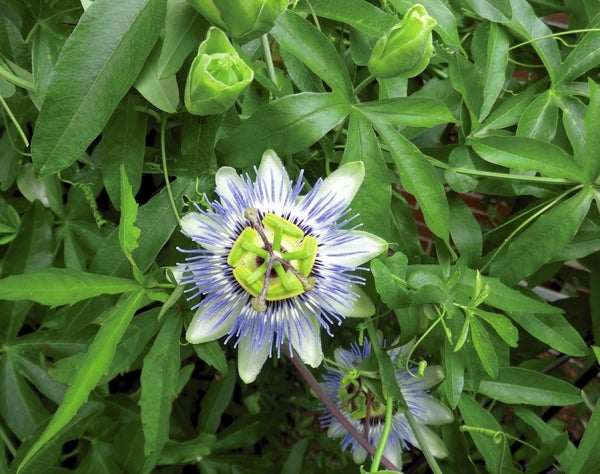Darrell Blackwelder: Questions about blooms
Published 12:03 am Friday, July 10, 2015

- Cooperative Extension The passion flower, or maypop, looks alien or fake because its features are so unusual.
The Fourth of July weekend gave us a few days of rainfall and cooler temperatures. But as we all know, July heat comes back, delivering its usual hot weather and excessively high humidity that we’ve learned to expect.
Coping with the excessive elements seems to get tougher every year. However, no matter how extreme the weather, many of our landscape plants continue to grow and flourish. Below are questions posed earlier this week by homeowners about flowering plants in the landscape that may be of interest.
Question: I noticed on the outside wall of the Agriculture Center in the pollinator garden there was a vine that looked like a vine my grandmother had at her home. We called them maypops and as kids we would pop the fruit. Is this the same vine?
Answer: Yes, it is most likely the same vine. Maypop or Passion flower (Passiflora incarnate), has a very distinctive, almost artificial-like purple flower that eventually produces egg shaped fruit that pops when squashed. The flower colors can vary from deep purple, pink to white flowers. According to medical experts, the native plant was and is still used as a medicinal herb for insomnia and anxiety. Go to https://plants.ces.ncsu.edu/plants/all/passiflora-incarnata/ for more detailed information.
Question: Mimosa trees were in full bloom last week and I think these are beautiful trees. However, I understand you discourage people from planting the tree. What is the rationale for not recommending the tree?
Answer: Mimosa trees are generally considered short-lived trees due to a root fungus that thrives in our soils. There are some trees resistant to the fungus, but are difficult to locate. This species just does not live well in this area.
Question: I heard one of the Master Gardener Volunteers talking about a perennial begonia that comes back every summer in their landscape. Can you tell me a little more about these plants?
Answer: Perennial begonias (Begonia grandis) are considered an heirloom plant passed along to neighboring gardeners and their friends. These plants adapt well to shady locations and grow best in rich, moist soils. The flowers are not as showy as cultivated, newer begonia varieties, but the foliage is outstanding. Go to https://plants.ces.ncsu.edu/plants/all/begonia-grandis/ for more detailed information on these plants.
Question: There’s an iris with a small orange bloom in my neighbor’s yard. She told me it was some type of blackberry plant. Can you tell me about this plant?
Answer: The plant garnering your interest is a blackberry lily (Iris domestica) or leopard flower or leopard lily. The plant gets its name from the seed head produced that looks like a blackberry fruit. It grows well in full sun and can take the heat of the summer. Go to http://uswildflowers.com/detail.php?SName=Iris%20domestica for more detailed information on blackberry lily.




